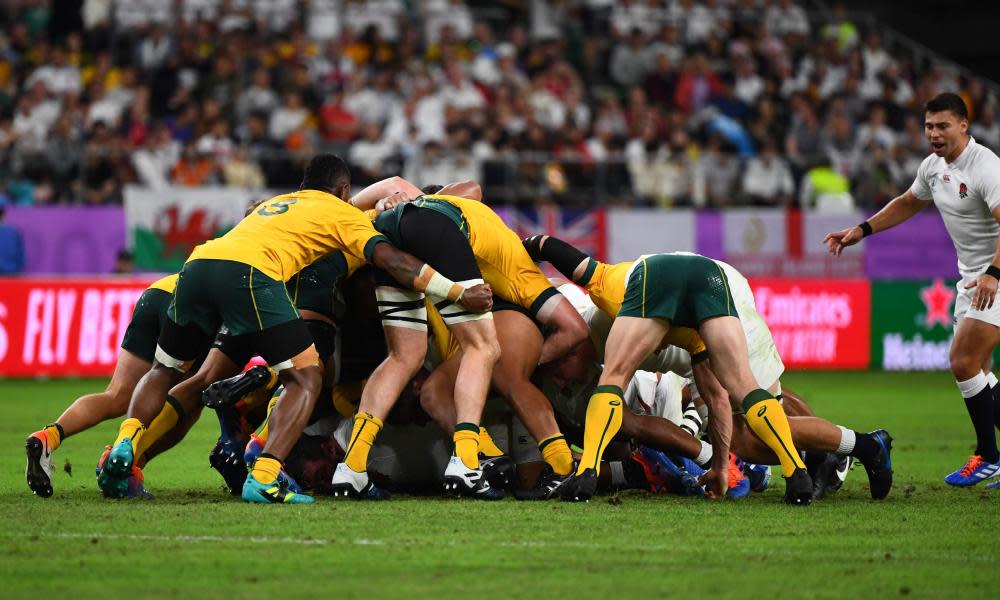Rugby Australia's financial pain felt widely but not shared universally

Rugby Australia has slashed jobs at its Sydney headquarters but so far it has not announced any plans to reduce new Wallabies coach Dave Rennie’s $1m a year salary. Given the current financial crisis, it seems to fly in the face of the ethos that everyone in the game share the economic pain brought on by the coronavirus pandemic.
Australian rugby is in a fight for survival and every dollar counts. Asking the incoming coach to make the same kind of sacrifice as other administrators, coaches and staff would appear to be a reasonable request in the circumstances.
Related: Clock ticks for Rugby Australia to avoid mass player exodus | Bret Harris
Former RA chief-executive Raelene Castle, who appointed Rennie to his three and a half year contract, took a 65% pay cut before she resigned last month, while other RA executives have taken 30% pay cuts. Players have also taken pay cuts averaging 60%. And an RA razor gang has slashed 47 of its 142 full-time jobs with a further 30 contractors and casual workers terminated, about 40% of staff gone in one swinging of the axe.
Also, RA will implement a 5% cut in base salary for all senior staff remaining. Overall, the cuts will reduce the wages bill by $5.5m a year. It is a desperate but necessary measure.
Why should Rennie be treated any differently to everyone else? It suggests RA is fearful Rennie would walk away from his contract if he was forced to take a pay cut or maybe the administration is waiting to see how many Tests the Wallabies will play this year before raising a possible salary adjustment with him.
Cutting Rennie’s salary is not going to save Australian rugby financially, but even if it were just a token gesture, to show solidarity with the rest of the rugby community, it could be a powerful symbol of unity for a game that has been so long divided.
Perhaps Rennie will volunteer to take a pay cut after he arrives in Australia next month. He may well already have done so behind the scenes – that would be the kind of leadership that would earn him the respect of the players if he did.
RA could certainly use the extra cash as it struggles to keep the game afloat. There were genuine fears the organisation may become insolvent after the game was forced to shut down because of the coronavirus. While RA is still a going concern after finally signing off on the company’s 2019 financial accounts, it appears it was a touch and go situation.
Savings are one thing, earnings are another. It has been reported that RA struck a series of last minute deals, including a $6.9m loan with HSBC, to keep the national union solvent. This is on top of the $14.2m loan RA has received from World Rugby, which is repayable in 2023. At the moment RA is encumbered by loans amounting to more than $20m with no income to speak of to pay them back.
The whole Australian rugby community will remain on tenterhooks until RA re-negotiates a new broadcast deal with Fox Sports, but no one knows what that deal will look like, if indeed it comes to fruition. The new deal will certainly not resemble the $57m a year Australian rugby is currently receiving from its broadcast partner.
With Super Rugby on hold for now, and possibly forever, RA is trying to organise a domestic competition involving the Brumbies, Melbourne Rebels, NSW Waratahs, Queensland Reds and the Western Force, who were booted out of the competition in 2017. The new competition is scheduled to kick off on the first weekend of July, but it will not get off the ground without a broadcast deal to fund it.
There is speculation Fox Sports will not support the domestic Super Rugby competition, but would prefer to broadcast Sydney and Brisbane club rugby, which would provide the pay TV network, which has its own financial challenges, with cheaper content to drive subscriptions from the rugby heartland. Hopefully, the rumour is incorrect because Australian rugby needs a strong, robust provincial competition of some sort to prepare players for Test rugby, assuming there are any international matches played this year.
Related: Rugby's factions must pull together or coronavirus crisis could tear sport apart | Robert Kitson
With all of the pressing issues facing the game, the Wallabies remain the No 1 rainmaker in Australian rugby, but the national team has performed disappointingly over the last four years, falling to seventh in the world. There are lots of things Australian rugby can do to win back disillusioned fans, but getting the Wallabies to start winning again is arguably the most important of all.
Perhaps this explains RA’s apparent reluctance to mess with Rennie’s salary while slashing and burning everywhere else. Rebuilding the Wallabies in uncertain times will be an enormous task. Maybe Rennie is just too valuable to risk losing at a time like this.

 Yahoo News
Yahoo News 
